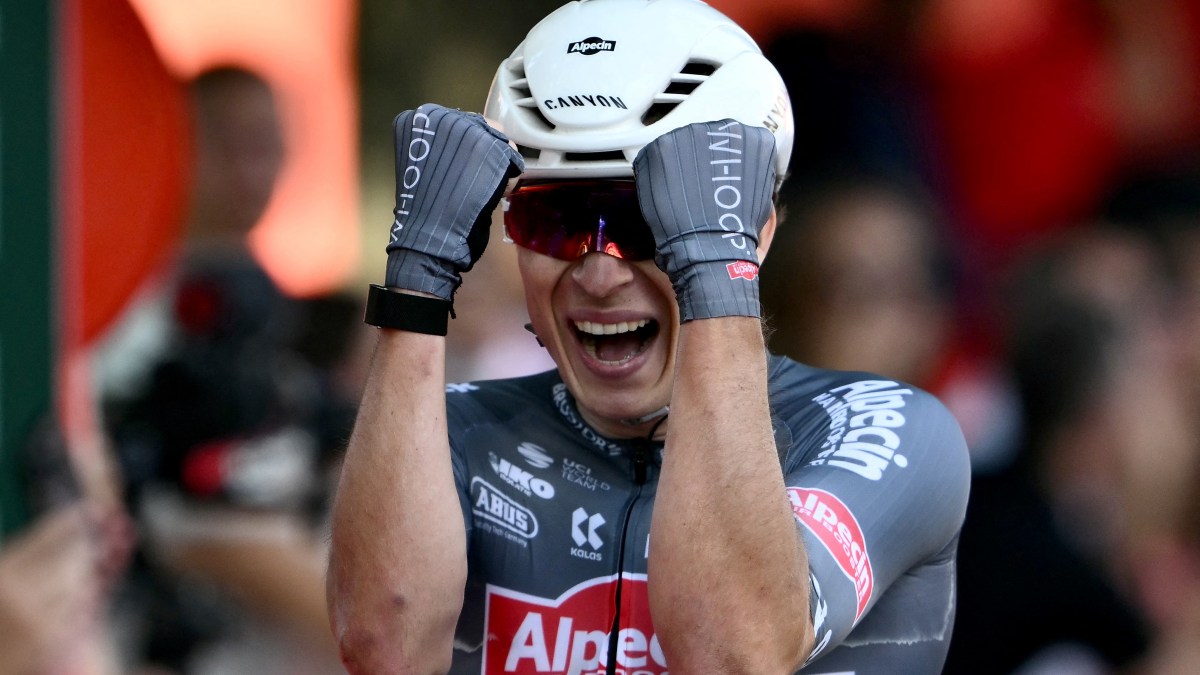Jasper Philipsen’s target was clear coming into La Vuelta and was voiced by his team: “Alpecin-Deceuninck lines up with one clear goal — stage wins, just as we’ve done in most previous grand tours.” And on stage one, that goal has already been achieved as the Belgian who just a month and a half ago had to abandon the Tour de France on stage three after a heavy crash, sprinted to victory in Novara and took the first Maillot Rojo of the race.
“Winning is always a nice feeling and definitely when there’s a reward like the Red Jersey, of course it’s a nice present,” said Philipsen after the race. “After my crash in the Tour I was really disappointed to be out. You work really long for it and it’s been a major goal and then its a setback and you have to find more goals. We know we only had one chance [at the Red Jersey] because there’s not many opportunities for a sprinter like me at this Vuelta.”
There is a case to be made that La Vuelta requires more consistency than any other grand tour. It is a race that is often harder and hotter than the others. One that, in seeking its own identity, adds as many summit finishes as it can and, as alluded to by Philipsen, fewer pure sprint days for the general classification (GC) riders to relax on. It is about concentrating on the quiet days and being able to respond when required; and on the inevitable bad days it’s about limiting losses. There is no easing into La Vuelta.

Philipsen is zipped into the Red Jersey, although he is likely to relinquish it in the mountains on Sunday
DARIO BELINGHERI/GETTY
Stage one, for example, covered 186km rolling out from the 17th-century Venaria Royal Palace in Turin to the Roman-founded city of Novara in Piedmont, northwest Italy. It was a flat stage with just one, early categorised climb but a necessary day to survive for all riders with an eye on winning the overall race because stage two won’t be so forgiving as the peloton hits the first summit finish atop the 10km category-two climb into Limone Piemonte. A GC team, then, must be prepared — especially when the absence of a certain Tadej Pogacar means the fight is wide open.
“I mean, of course it’s always nice to race against Tadej on one hand,” Jonas Vingegaard, the two-times Tour de France champion and the Slovenian’s great rival, said before the race, “but also on the other hand, it’s also nice to race where he’s not sometimes.”
It was a day on which La Vuelta favourite Vingegaard and his Visma-Lease a Bike team could usually have been forgiven for sitting back. And yet, they were near the front of the peloton all day long, sitting quietly behind the sprint teams Alpecin and Lidl-Trek. Visma kept their leader safe and signalled that they were ready for the three-week fight from the start.
After all, it is easy for riders and teams to lose concentration on flat days like this, easy also for a silly coming together of wheels, a slight misjudgment of a corner. To win a race, a rider has to finish it.

Vingegaard, in the red helmet, is safely escorted to the finish by his Visma team, who signalled their readiness to compete for the GC
DARIO BELINGHERI/GETTY
Positioning is not necessarily a strength of Vingegaard’s two main rivals, João Almeida and Juan Ayuso of UAE-Team Emirates — another pair of riders looking to step out of the shadow of their dominant team-mate Pogacar. But in the final 30km of the stage, with the early breakaway caught, UAE kicked into gear, bringing their co-leaders to the front and reigniting the season-long battle between cycling’s two super teams. So far this season, it’s one grand tour each — and clearly both are very serious about taking red in Spain.
With 20km to go, the day’s somewhat pedestrian pace was picked up as the peloton wound its way into the narrow roads of the towns. UAE and Visma led the way between the red-roofed buildings and across the roundabouts and the peloton grew nervous.
Once the GC teams reached the 3km safe zone, they finally relaxed and sat back and allowed the sprint teams to take to the front. A winding entry into the finish line made it difficult for the sprint trains to form and Philipsen was the best positioned in the final kilometre behind his team-mate Edward Planckaert, while Mads Pedersen of Lidl-Trek was caught completely out of position and had to settle for 14th place.
Philipsen unleashed his power with 175 metres to go and no one could respond. Britain’s Ethan Vernon, of Israel–Premier Tech, launched his impressive sprint early after getting caught behind Alpecin, but couldn’t match Philipsen and came in second ahead of Movistar’s Venezuelan rider Orluis Aular in third.
Tom Pidcock, of Q36.5, who is targeting a top-ten finish in the GC, managed a surprise ninth position despite not being a sprinter, while Ben Turner of Ineos Grenadiers (12th) and Jake Stewart of Israel–Premier Tech (19th) got into the top 20. And all of the protagonists of this Vuelta came in safely ready to do battle on the first summit finish on Sunday.

